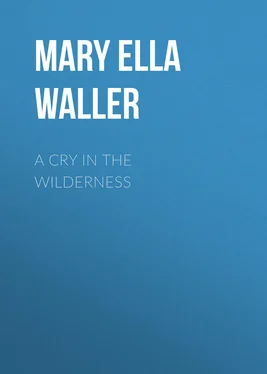Mary Waller - A Cry in the Wilderness
Здесь есть возможность читать онлайн «Mary Waller - A Cry in the Wilderness» — ознакомительный отрывок электронной книги совершенно бесплатно, а после прочтения отрывка купить полную версию. В некоторых случаях можно слушать аудио, скачать через торрент в формате fb2 и присутствует краткое содержание. Жанр: foreign_prose, foreign_antique, на английском языке. Описание произведения, (предисловие) а так же отзывы посетителей доступны на портале библиотеки ЛибКат.
- Название:A Cry in the Wilderness
- Автор:
- Жанр:
- Год:неизвестен
- ISBN:нет данных
- Рейтинг книги:4 / 5. Голосов: 1
-
Избранное:Добавить в избранное
- Отзывы:
-
Ваша оценка:
- 80
- 1
- 2
- 3
- 4
- 5
A Cry in the Wilderness: краткое содержание, описание и аннотация
Предлагаем к чтению аннотацию, описание, краткое содержание или предисловие (зависит от того, что написал сам автор книги «A Cry in the Wilderness»). Если вы не нашли необходимую информацию о книге — напишите в комментариях, мы постараемся отыскать её.
A Cry in the Wilderness — читать онлайн ознакомительный отрывок
Ниже представлен текст книги, разбитый по страницам. Система сохранения места последней прочитанной страницы, позволяет с удобством читать онлайн бесплатно книгу «A Cry in the Wilderness», без необходимости каждый раз заново искать на чём Вы остановились. Поставьте закладку, и сможете в любой момент перейти на страницу, на которой закончили чтение.
Интервал:
Закладка:
Delia smiled indulgently upon me.
"Such fancies will help you out a good bit, my dear; it's well you have a word or two of French to get along with. I used to hear it when I was a girl in Cape Breton."
I caught the shadow of a memory settle in her eyes. We were at the gate. The train was made up.
"I must say goodby here, my dear; they won't let me in to the train."
I took both her hands again. "Goodby, Delia Beaseley," I began; then something choked me. I so wanted to thank her for all her goodness to me. "I wish I knew what to say—how to thank—"
"There, there, my dear, I 'm the one to be thankful. I 've been reaping a harvest just from one little seed I sowed near twenty-six years ago—and I never thought to see so much as a blade of grass! That's all. I 'm wonderful grateful it's been given me to see such a harvest."
"Oh, Delia, if I only amounted to something, so that you could be proud of your little harvest—"
"Now, don't, my dear, don't; don't say nothing more, but just go straight forward with God's blessing, which is the same as mine this time, and—don't forget me if ever you need a friend."
My eyes filled with unaccustomed tears. A curious thought: New York, the Juggernaut, the fetich of millions, just when I was ridding myself of the horror of its awful presence, was about to bind me to it through this new-old friend!
I caught her rough toil-worn hand in both mine and pressed my lips to it; then I dropped it, and walked rapidly down the platform to the train. Not once did I look behind me.
For a little while after entering the luxurious sleeping car, I felt awkward, uncomfortable; I had never been in one before. But when I was settled in my ample, high-backed section, and the train began to move slowly out of the station and through the tunnel, I felt more at ease. After that, with every mile that the train, moving more and more swiftly, put between me and the city's sights and sounds, I felt a rising of spirits, an ease of mind and body I had never before experienced.
Within an hour all depression had vanished; hopes and anticipations for the new environment filled the foreground of my thoughts. Without adequate reason, I believed that the change I was making was for my good; that with new faces about me, with new and closer interests which, alone as I was in the world, I must substitute for a home, I was about to escape from all former associations and the memories they fostered.
Only one thought troubled me, that was the connection by Delia Beaseley of Doctor Rugvie's name with that of George Jackson—my mother's husband. I had hoped never to hear that name again.
For an hour I peered at the dark Hudson, the shadowed hills; the night fell, blotting out the landscape wholly and shutting me into the warm brilliantly lighted car with a sense of cosy security.
I looked at the few people I could see over the high sections. Three women were opposite to me, two of them young. I found myself calculating the cost of their dresses and accessories, their furs and hats. I reckoned the amount to be something like my wages on the farm for six years. How easily and unconsciously they wore their good clothes! One of the two younger held my attention. She was fair, slender, long-throated, and carried herself with noticeable erectness. I caught bits of their conversation carried on in low pleasing voices:
"It will be such a surprise to them."
"… the C. P. steamer—"
"Oh, fancy! They must have known—"
"… you know I am glad to be at home this winter…"
"Where is it? …"
"Somewhere in Richelieu-en-Bas—"
I was all ears. Richelieu-en-Bas was my destination. Their voices were so low I could catch but little more.
"Just fancy! But you would never know from him—"
"When is Mr. Ewart coming over?"
"Bess!" The fair one held up a warning finger; "your voice carries so." She rose and reached for her furs from the hook. "Let's go into the forward car and see the Ellwicks."
The others rose too; shook themselves out a little; patted hair rolls, changed a hairpin, took down their furs and left the car—tall graceful women, all of them.
Since my illness I had squeezed out from my earnings enough for the passage money, fourteen dollars, and eight besides. I did n't want to begin by being indebted to any one in the Seigniory of Lamoral for that amount; and I did n't want it deducted from my first wages. I pleased myself with the fancy that, soon after my arrival, I should give the money into some one's hands with an appropriate word or two, to the effect that I had chosen to pay my own travelling expenses. That sounded better than passage money which was reminiscent of the steerage.
They should understand that if I were at service, I had a little moneyed independence of my own—the pitiful eight dollars with which to go out into the new country. Immigrants have come in with less than this—nor been deported. Well, I ran no risk of being deported from Canada.
I asked the porter to make my berth early. About nine I lay down, tired and worn out with the excitement of the past three weeks. I drew the curtains close to shut out the night, and lay there passively content, listening to the steadily accented clankity-clank-clank of the Montreal night express.
I liked the sound; it soothed me. This swift on-rush into the night towards Canada, the even motion, began to rest the long over-strained nerves. During these hours, at least, I was care free. I slept.
For the first time for months that sleep was long, unbroken, dreamless. I awoke refreshed, strengthened. Drawing the window curtains aside, I looked out upon a world newly bathed in the early morning lights.
At the sight, my enthusiasm, which I thought quenched forever in the overwhelming flood of adverse circumstance, was rekindled; my imagination stimulated. Dawn was breaking clear and golden behind the mountains across Lake Champlain. Green those mountains are in the October sunlight, green and yellow and frost-wrought crimson; but now they loomed dark against the horizon's deepening gold. A few small dawn clouds of pure rose and one, gigantic, high-piled, of smoke gray, hung motionless above the mist-veiled waters of the lake.
I watched the coming of this day with charmed eyes. The sun rose clear, undimmed over the shadowed mountains. The lake mists felt its beams; dispersed suddenly in silver flocculence; and the path across the blue waters was free for the morning glory that was advancing apace.
BOOK TWO
THE SEIGNIORY OF LAMORAL
I
"Richelieu—Richelieu-en-Bas."
The captain of the local freight and passenger boat, that had taken six hours to make its trip down the St. Lawrence from Montreal, pointed encouragingly to the low north bank of the river. I looked eagerly in that direction.
"Richelieu-en-Haut is back there," with a sweep of his hand northwards, "six miles back on the railroad."
The little steamer was running, at that moment, within twenty feet of the low bank which, I saw at once, had been converted into a meandering village street, built up only on one side. A double row of trees shaded both houses and highway. We were within confidential speaking distance of the few people I saw in the street, and apparently on intimate terms with the front rooms of the tiny houses. We sailed past the market-place square, past the long low inn with double verandas, past the post office, and drew to the landing-place which the steamer saluted.
This salute was the signal for the appearance of what appeared to me the entire population of the place. There were people under the lindens, people at the doors and open windows, people in boats rowing towards us; one man was poling a scow in which were a cow and two horses. There were men with handcarts, boys with baskets, old women and young girls, all talking, gesticulating freely.
Читать дальшеИнтервал:
Закладка:
Похожие книги на «A Cry in the Wilderness»
Представляем Вашему вниманию похожие книги на «A Cry in the Wilderness» списком для выбора. Мы отобрали схожую по названию и смыслу литературу в надежде предоставить читателям больше вариантов отыскать новые, интересные, ещё непрочитанные произведения.
Обсуждение, отзывы о книге «A Cry in the Wilderness» и просто собственные мнения читателей. Оставьте ваши комментарии, напишите, что Вы думаете о произведении, его смысле или главных героях. Укажите что конкретно понравилось, а что нет, и почему Вы так считаете.












